There is a difference between the borders on the world’s surface and those below it. That difference may sometimes decide on the matter of life and death. The most recent earthquake in southern Türkiye and northern Syria is demonstrating this.
Below the surface, the earth’s different plates comprise the natural borders. According to experts, the earthquake was caused by the tension between the Arabian Plate and the Anatolian Plate.
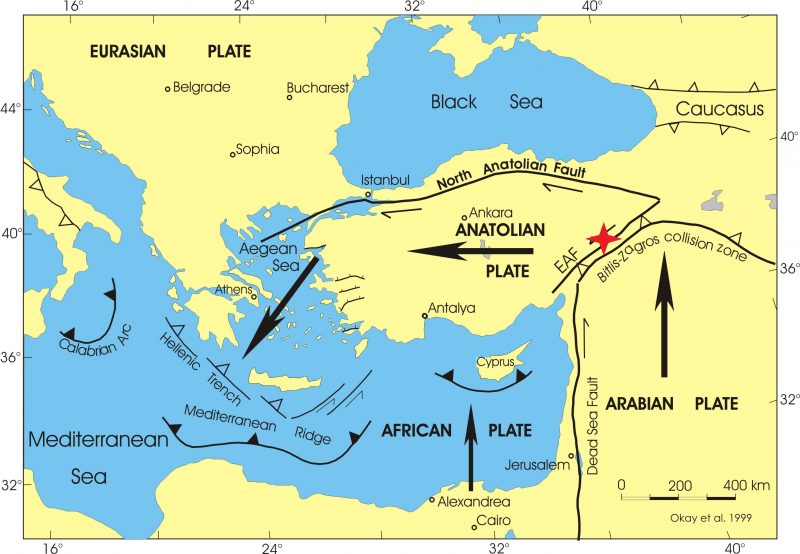
The plate runs north and parallel to the Turkish-Syrian border, and is connected to the Dead Sea Fault that reaches south as far as to Egypt.
The epicenter of the earthquake was located in the district of Pazarcık in the city of Kahramanmaraş. Latest numbers on Tuesday 2 PM say that 3432 people have lost their lives in Türkiye and more than 1600 in Syria. Even 4 people died in Egypt.
Above the surface, works to rescue people from crushed building continue at the highest pace. Both countries’ governments mobilize all resources at hand for saving operations and providing support to survivors of the earthquake.
The so-called international community also reacted. The Turkish Presidency received a number of calls of solidarity from world’s leaders. Several countries from all over the world, from the US and Taiwan to Russia and China as well as the European Union have dispatched special rescue teams to Türkiye.
South of the border, the Syrian Presidency received similar calls from Russia, China, Bahrain, Algeria and Iran.
In a tweet, US President Biden offered condolences to both countries, Türkiye and Syria. But he promised aid only to Türkiye, reflecting his country’s fierce embargo imposed on the Syrian Arab Republic.
Since years, Syria has been suffering under a US imposed embargo, sharpened with the Ceasar Act.
Head of the Syrian Arab Red Crescent (SARC), Eng. Khaled Hboubati, has appealed to lift the siege and economic sanctions imposed on Syria to face the repercussions of the devastating earthquake.
“We need heavy equipment, ambulances and firefighting vehicles to continue to rescue and remove the rubble, and this entails lifting sanctions on Syria as soon as possible,” Hboubati said during a press conference on Tuesday.
Syria is disconnected from the international payment system SWIFT and trade with the country is limited due to economic crisis and sanctions threats.
Differing local authorities beyond the control of the central government further complicate providing help to affected territories in Syria. The BBC, a media connected to the so-called White Helmets, the British spying and civil intervention NGO, paints the following map for the region.
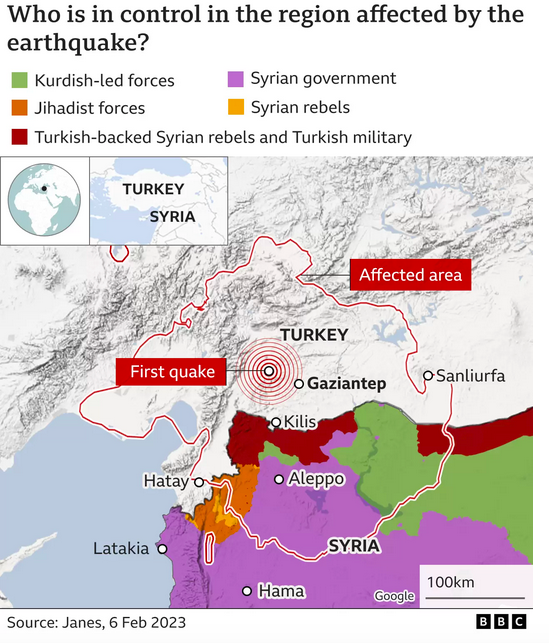
Western countries are already trying to use the earthquake to deepen their leverage on so-called opposition areas.
The Syrian government principally insists that all humanitarian aid to Syria should be delivered via Damascus. Western countries on the other side push to open more border crossings from Türkiye to Syria in order to deliver aid – and possibly other materials, directly to the regions outside Damascus’ control.
With no word, thus implicit acknowledgement of embargo and continued military attacks on Syria, Amnesty International for instance insisted that the Syrian government should allow more aid to reach aid in oppositional areas.
“The areas worst affected by the earthquake inside Syria look to be run by the Turkish-controlled opposition and not by the Syrian government,” said Mark Lowcock, the former head of UN humanitarian affairs according to the Guardian. “It is going to require Turkish acquiescence to get aid into those areas. It is unlikely the Syrian government will do much to help.”
While different geological plates clash below the surface, the political lines above are also being shaken. Recently, Turkish and Syrian government officials met under Russian mediation.
These meetings offer hope that, after 11 years of political, military and humanitarian friction, West Asia may get closer to unity.
Earthquakes have shown they do not recognize borders. Death, pain and suffering also do not. Time has come for politicians to acknowledge that and act accordingly.


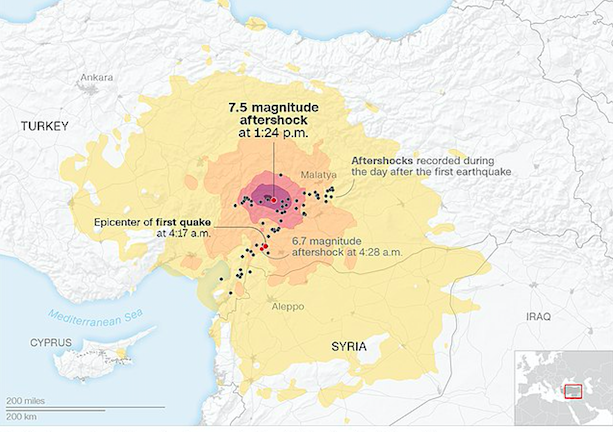
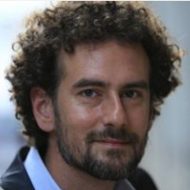



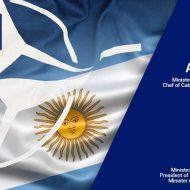

Leave a Reply